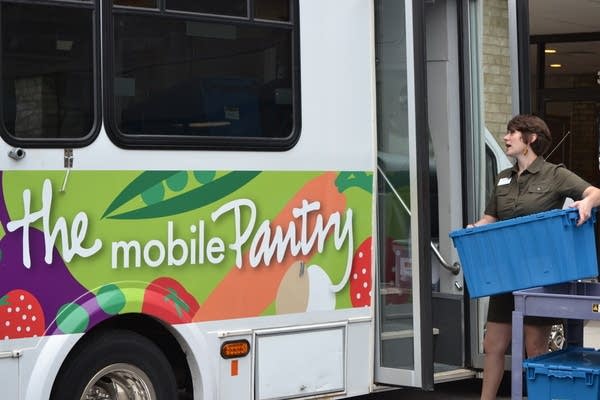Traveling food pantries serve a growing need

A new kind of food truck is driving around the Twin Cities.
These trucks aren't serving gourmet fare. Instead, they're packed with canned goods and produce -- free food for people who struggle to afford enough on their own.
A growing number of food shelves in Minnesota have launched mobile pantries to take food directly to those who need it. Among those that have is the NorthPoint Food Shelf in Minneapolis.
Twice a month, NorthPoint workers load an old delivery truck with food and head to places like St. Anne's Community Center, which provides below market rent for seniors.
Create a More Connected Minnesota
MPR News is your trusted resource for the news you need. With your support, MPR News brings accessible, courageous journalism and authentic conversation to everyone - free of paywalls and barriers. Your gift makes a difference.
"People are having trouble getting to the food, so we try to make it much more accessible for them by bringing it out to them," Marquis Wise, food shelf lead for NorthPoint said on the way there. Many of the seniors at St. Anne's use walkers or motorized scooters and don't have cars.
While the truck is en route, Francisca Rivera, a community health worker at NorthPoint, already is taking orders at St. Anne's.

"You can have chicken, beef, white or brown rice," Rivera tells St. Anne's resident Ineze Ellis. "The brown rice is really good, have you tried it?"
Ellis, 77, sits on her walker, skeptical of brown rice. But she said having the mobile food shelf park outside her apartment building is a big help. She cannot afford to buy fruit regularly and does not have an easy way get to the local food shelf.
"I have no car, and I got nobody who lives in town with cars, to get any place," Ellis said.
NorthPoint launched its mobile unit in May with a $50,000 grant from the Greater Twin Cities United Way and another $45,000 from Hunger-Free Minnesota.
In a surge of grant awards, Hunger-Free Minnesota, the United Way, and the state of Minnesota have given nearly $400,000 in the past year to mobile food pantries.

A task force composed of several nonprofit groups that have such programs began meeting in May to figure out the best and most cost-effective ways to run a mobile food shelf.
Meanwhile, mobile pantries are expanding beyond urban areas.
In the southeast Twin Cities suburbs, another mobile food pantry stops outside Inver Hills Community College, which serves many non-traditional students. A recent survey at Inver Hills found 40 percent of students need food assistance.
"I think that the campus was shocked," said Katie Halcrow, director of Service Learning at Inver Hills Community College.
The survey also showed that it's tough for students to get to a food shelf because they're short on both time and transportation. "If you've got two kids, and you're working, and you're going to school, it's just a lot to juggle," Halcrow said.

To meet the need, the campus began working with Eagan and Lakeville Resource Centers. Its executive director, Lisa Horn, wasn't surprised to hear students were struggling to find transportation to the food shelf, a common problem for clients in the suburbs.
"We do have a lot of folks that call at the last minute and say, 'I can't come because my ride cancelled on me, or my car's not working, or I don't have enough gas in my vehicle to get to your food shelf,'" she said.
Horn paid $10,500 for the truck, and spends about $700 monthly in gas and insurance. But she said that's cheap compared with rent and maintenance for a regular food shelf.
David Dayhoff, director of partnership engagement and advocacy for Hunger-Free Minnesota, would like to see more mobile food units to serve areas of the state where people don't have easy access to food aid.
"So you have to figure out -- if we were to have a food shelf there, how could we do it? One alternative would be to open new brick and mortar food shelves," Dayhoff said. "But in fact in many cases that's probably not as good of an idea as having an existing food shelf launch a mobile program to go target those areas that are underserved."
So far, the Eagan mobile food pantry has served 1,840 households at three locations since it first launched last September. The NorthPoint mobile unit has served about 150 people in eight visits. Organizers of both mobile programs expect those numbers will continue to rise.

Dayhoff isn't arguing that traditional food shelves should disappear. Indeed, mobile units depend on them to organize and store food. But he said those mobile units can be very cost-effective, as long as they serve enough people at one stop.
The traveling food shelves also are more flexible. If poverty rises or falls in particular areas, Dayhoff said, they can be diverted to places they are needed most.
In Minneapolis, NorthPoint is taking its mobile food service one step further by also sending health workers.
On the recent visit, LaTrisha Vetaw, a community health worker for NorthPoint, took Ineze Ellis' blood pressure. And her numbers weren't good.
"You should try to take your blood pressure medication every day at the same time," Vetaw said.
As Vetaw sees it, a person who needs food likely needs other services.
"If people have a hard time getting into a food shelf, more than likely they have a hard time getting in to doctor's visits as well," Vetaw said. "So we lure them in with the food, and then we talk to them about all the other important components of their health."
She sends Ellis away with a final nudge.
"Next time we come back the pressure is going to be lower, right?"
Ellis leaves with food -- and a promise to take those meds.
